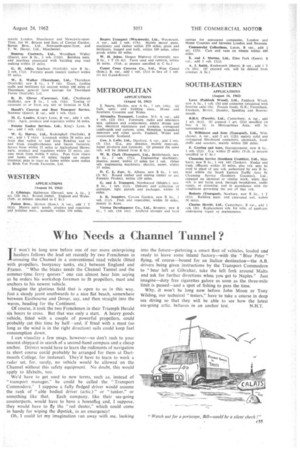Who Needs a Channel Tunnel ?
Page 63

If you've noticed an error in this article please click here to report it so we can fix it.
Ifwon't be long now before one of our more enterprising hauliers follows the lead set recently by two Frenchmen in crossing the Channel in a conventional road vehicle (fitted with propellers, buoyancy tanks, etc.) between England and France. "Who the blazes needs the Channel Tunnel and the summer-time ferry queues," one can almost hear him saying as he orders his workshop foreman to fit propellers, mast and anchors to his newest vehicle.
, Imagine the glorious field that is open to us in this way. Just a steady jaunt southwards to a nice flat beach, somewhere between Eastbourne and Dover, say, and then straight into the waves, heading for the Continent. .
Of course, it took the two Frenchmen in their Triumph Herald six hours to cross. But that was only a start. A heavy goods vehicle, fitted with a couple of powerful propellers, could probably cut this time by half—and, if fitted with a mast (so long as the wind is in the right direction) sails could keep fuel consumption down.
I can visualize a few snags, however—so don't rush to your nearest shipyard in search of a second-hand compass and a cheap anchor. Drivers would have to learn the rudiments of navigation (a short course courd probably be arranged for them at Dartmouth College, for instance). They'd have to learn to work a radar set, for, surely, no vehicle would be allowed on the Channel without this safety equipment. No doubt, this would apply to lifebelts, too.
We'd have to get used to new terms, such as, instead of "transport manager," he could be called the "Transport Commodore." I suppose a fully fledged driver would assume the rank of "able bodied driver (artic.) " or "tanker," or something like that. Each 'company, like their sea-going counterparts, would have to have a houseflag and, I suppose, they would have to fly the "'red duster," which could come in handy for wiping the dipstick, in an emergency!
Oh, I could let my imagination run away with me, looking into the future—picturing a smart fleet of vehicles, loaded and ready to leave some inland factory—with the ".Blue Peter" flying, of course—bound for an Italian destination—the A.B. drivers being given instructions by the Transport Commodore to "bear left at Gibraltar, take the left fork around Malta and ask for further directions when you get to Naples." Just imagine—duty free cigarettes galore as soon as the three-mile limit is passed—and a spot of fishing to pass the time.
Why, At won't be long now before John Moon or Tony Wilding, our technical "testers," have to take a course in deep sea diving so •that they will be able to see how the latest sea-going artic. behaves in an anchor test. N.H.T.








































































































